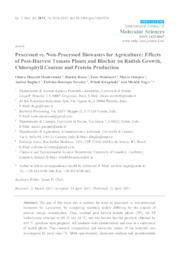Processed vs. non-processed biowastes for agriculture: effects of post-harvest tomato plants and biochar on radish growth, chlorophyll content and protein production.
Processed vs. non-processed biowastes for agriculture: effects of post-harvest tomato plants and biochar on radish growth, chlorophyll content and protein production.
Author(s): MONTERUMICI, C. M.; ROSSO, D.; MONTONERI, E.; GINEPRO, M.; BAGLIERI, A.; NOVOTNY, E. H.; KWAPINSKI, W.; NEGRE, M.
Summary: The aim of this work was to address the issue of processed vs. non-processed biowastes for agriculture, by comparing materials widely differing for the amount of process energy consumption. Thus, residual post harvest tomato plants (TP), the TP hydrolysates obtained at pH 13 and 60 °C, and two known biochar products obtained by 650 °C pyrolysis were prepared. All products were characterized and used in a cultivation of radish plants. The chemical composition and molecular nature of the materials was investigated by solid state 13C NMR spectrometry, elemental analysis and potentiometric titration. The plants were analysed for growth and content of chlorophyll, carotenoids and soluble proteins. The results show that the TP and the alkaline hydrolysates contain lignin, hemicellulose, protein, peptide and/or amino acids moieties, and several mineral elements. The biochar samples contain also similar mineral elements, but the organic fraction is characterized mainly by fused aromatic rings. All materials had a positive effect on radish growth, mainly on the diameter of roots. The best performances in terms of plant growth were given by miscanthus originated biochar and TP. The most significant effect was the enhancement of soluble protein content in the plants treated with the lowest energy consumption non processed TP. The significance of these findings for agriculture and the environment is discussed.
Publication year: 2015
Types of publication: Journal article
Unit: Embrapa Soils
Observation
Some of Embrapa's publications are published as ePub files. To read them, use or download one of the following free software options to your computer or mobile device. Android: Google Play Books; IOS: iBooks; Windows and Linux: Calibre.
Access other publications
Access the Agricultural Research Database (BDPA) to consult Embrapa's full library collection and records.
Visit Embrapa Bookstore to purchase books and other publications sold by Embrapa.

